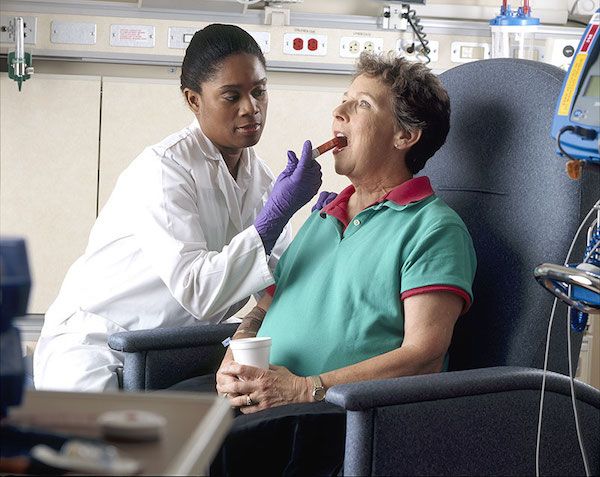New Rinse Can Help Dentists Get More Involved in Cancer Treatment
Chemotherapy and radiation treatments for head and neck cancers cause serious oral side effects, oral mucositis as the primary culprit. A new rinse in Phase 2 clinical trials shows positive results in reducing oral ulcerations with a possibility for prophylactic use.

"Patients who develop severe ulcerative oral mucositis are 3-4 times more likely to experience an interruption in their chemoradiation" said Alan F. Joslyn, PhD, President & CEO of Oragenics, Inc.
A rinse formulated from a Gram-positive bacterium for the treatment of oral mucositis is showing positive results in its interim safety analysis on patients from its Phase 2 clinical trial. Oragenics, Inc. holds the worldwide license on AG013, a food grade microbe Lactococcus lactis producing human Trefoil Factor 1(hTFF1), an essential protein to the mucosa lining of the oral cavity. The information in the study indicates that the incidence of oral mucositis is likely less than in the general population and the clinical trial is permitted to proceed with no changes to the study.
Oral Mucositis, a painful condition beginning after the initiation of chemotherapy and radiation treatments, is a prevalent side effect of cancer treatment therapies. Inflammation of the oral tissues causes ulcerations to occur as soon as a week after the first administration and can lead to nutritional problems and an increased risk of infection. Patients who suffer from oral mucositis avoid activities resulting in tissue manipulation, like homecare routines and necessary dental office visits.
Other side effects from chemotherapy and radiation, such as reduced salivary flow, nausea and vomiting, further compromise the patient’s oral health after receiving cancer treatments. Avoidance of dental treatment during periods of compromised immunity often leaves patients with severe complications such as dental decay and periodontal disease. New measures to reduce complications from oral mucositis might help dentists remain more involved in the treatment process.
Preventative Intervention
When asked about the potential for preventative use, Alan F. Joslyn, PhD, President & CEO of Oragenics, Inc., said “The primary endpoint is reduction in number of days of ulcerative oral mucositis” adding “we are also collecting information on the number of patients that never develop ulcerative oral mucositis, which would be ‘responders’ and this would constitute a prevention claim.” The trial’s conclusion will provide more evidence on the claim.
Patients who have an increased risk of developing oral mucositis, like individuals with poor hygiene, compromised immunity and smokers, might benefit from a product commercialized for the prevention of oral mucositis. The dental professional’s awareness of risk factors places them at the forefront of prevention in the fight against the condition. Open communication between the patient, dentist and oncologist will be imperative for proper administration of the AG013 rinse.
Cost Advantages to Patients
Joslyn says reducing the likelihood of treatment interruption from ulcerative oral mucositis has the greatest potential cost benefit for patients. “Patients who develop severe ulcerative oral mucositis are 3-4 times more likely to experience an interruption in their chemoradiation regimen and experience a 2-8 times greater cost” he said, adding that affected patients experience “on average 9 extra days in the hospital related to management of oral mucositis.”
The research has not extended to the potential benefits it could offer to dentistry, according to Joslyn, but its advantages to the dental community are apparent. Losing track of patients during cancer treatment is a common issue aggravated by the presence of oral mucositis. The ability to combat painful oral ulcerations with a well-tolerated prescription rinse could reduce treatment avoidance.
Application
The product is an “easy-to-use at home rinse”, said Joslyn, adding “in office treatments may occur but are not necessary”. When asked who the primary prescribers of the AG013 mouth rinse would be, Joslyn says it is undetermined. When the product is developed for release into the market, dentists will have a new tool in their armamentarium for combating adverse side effects associated with necessary chemotherapy and radiation treatments.
Click here to sign up for more Dentist's Money Digest content and updates.RELATED: More Coverage on
- Cancer Prevention Important to Dentists, Yet Many Avoid HPV Talk
- Dental Disorders Rank in Top 3 Avoidable Emergency Visits
- Dental Therapy: It's Advantages and Downfalls
ACTIVA BioACTIVE Bulk Flow Marks Pulpdent’s First Major Product Release in 4 Years
December 12th 2024Next-generation bulk-fill dental restorative raises the standard of care for bulk-fill procedures by providing natural remineralization support, while also overcoming current bulk-fill limitations.